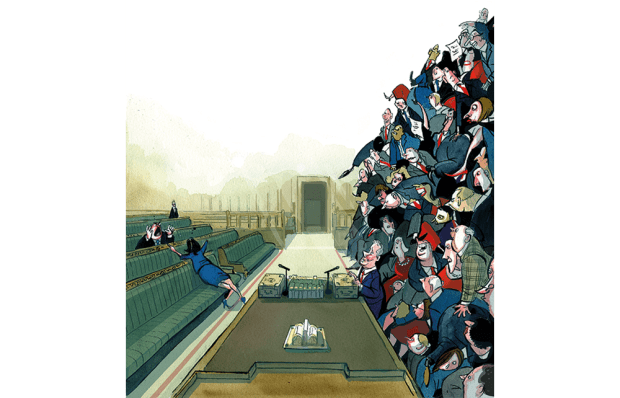Ill-judged
Sir: Professor Carl Henegan’s authoritative demolition of the Covid Inquiry (‘The Covid whitewash’, 4 November) prompts the question of why judges are normally appointed to chair public inquiries. Lady Hallett has clearly had a distinguished law career, but has no apparent expertise in government, public health, epidemiology, medicine or science. Her first move on being appointed was not to remedy these deficiencies but to spend more than £100 million hiring other lawyers – and the only possible explanation for the inquiry’s behaviour is that they believe they’re in a court of law and having already stated their positive view of lockdown, see themselves as acting for the defence. Hence their deployment of the usual tricks of talking up the credentials of their witnesses and seeking to denigrate those of the other side.
Lady Hallett is unfortunately likely to join the long list of distinguished retired judges whose reputation was tarnished by lending their names to widely derided public inquiry reports.
Christopher Wyke
Worthing, West Sussex
The lockdown of debate
Sir: Carl Heneghan’s article was timely but depressing. At the start of the pandemic I followed the debate in Sweden closely and found the arguments of their experts persuasive. I was therefore alarmed when reputable scientists such as Professor Heneghan and Sunetra Gupta, professor of theoretical epidemiology at Oxford, were not only ignored by the government, but for reasons I could never fathom deemed ‘right-wing’ by the left-wing press. I, a cradle socialist, was also tarred with this brush when I wrote a couple of articles in support of their policies. As Professor Heneghan suggests, this attitude was not only ignorant but unscientific and has done immense harm to our children, young people and economy. According to the evidence, it has not saved lives either.
Salley Vickers
London W11
According to Matthew
Sir: In his column Matthew Parris (‘The dangers of righteous anger’, 4 November)says that now is the time to ‘dial down’ anger. I have no idea what Matthew cares for, but I remember a touching piece by him some years ago about his pet llamas.
Imagine if Matthew’s llamas were attacked in the most brutal imaginable ways: pregnant llamas having their bellies slashed and their unborn torn out; baby llamas beheaded and thrown in ovens; female llamas raped and abducted. And all by an organisation that said it would not stop until it had wiped all llamas from the Earth. In such a situation I imagine even Matthew might be filled with anger, and would not wish to listen to far-off, pseudo sage-like voices, telling him to ‘dial it down’. Replace ‘llamas’ with ‘Jews’ and he might get the tiniest idea of why some of us don’t think this a time for fence-sitting.
Douglas Murray
Via email
A question of trust
Sir: Charles Moore states (The Spectator’s Notes, 4 November): ‘Zewditu Gebreyohanes was informed by the National Trust that there would be no room for her at the AGM on 11 November. Since, at last year’s meeting, Zewditu was the star critic from the floor, one may suspect the NT is not neutral about who can attend its meeting in person.’ This insinuation is unfair and unfounded. Civica Election Services, our independent provider, runs a ballot to ensure all members have an equal chance to attend an AGM in person. Any member not offered a seat can attend the AGM online, where they can vote and ask questions in the same way as those in the room. It would be unjust and unconstitutional for the National Trust to guarantee places to any member on the grounds of their affiliation to a private company such as Restore Trust.
Jan Lasik
General Counsel and Secretary, National Trust
Western intelligence
Sir: In his otherwise accurate arguing of the UK’s need to lead the regulation of AI (‘Mind games’, 28 October) James W. Phillips ignores the fundamental point that makes him wrong. Many others will be in the race to build a super-intelligence. Some will have no interest in bettering the future of the UK or any other democracy. If we slow those friendly to the western way of life, they will lose to others who will never be so regulated and will then be empowered to cause us harm. Oversight and swift reaction are the way forward. Prescriptive regulation will only hasten the end of days.
Tom Baigrie
London SW18
Deer Toby
Sir: Reflexively, I felt sure Toby Young was right about class envy driving the Scottish government to cull deer, and thus essentially end deer stalking (No sacred cows, 14 October). But then I visited the Mar Lodge Estate in Aberdeenshire. In the part where deer have been culled, trees are growing. It is stunning. We know from our garden near Ashdown Forest how destructive deer can be. It seems obvious that if you don’t reduce the population you won’t have trees. No doubt government edicts are dangerous in principle. But just because landowners like a high number of deer for monetary purposes doesn’t make them right either.
Nick Delfas
Sharpthorne, Sussex
A daughter writes…
Sir: Robin Ashenden (‘The full English’, 14 October) should take his daughter to London Zoo, where he can buy her a peacock feather. Also to the Tower of London to see the Crown Jewels, then a boat trip down the Thames – just as my parents took me some 65 years ago.
Judith Hampshire
Reykjavik, Iceland
Got something to add? Join the discussion and comment below.
Get 10 issues for just $10
Subscribe to The Spectator Australia today for the next 10 magazine issues, plus full online access, for just $10.
You might disagree with half of it, but you’ll enjoy reading all of it. Try your first month for free, then just $2 a week for the remainder of your first year.














Comments
Don't miss out
Join the conversation with other Spectator Australia readers. Subscribe to leave a comment.
SUBSCRIBEAlready a subscriber? Log in